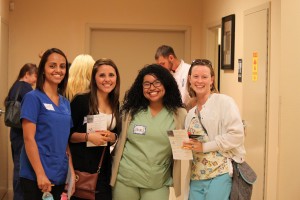From: www.post-gazette.com
By David Templeton
The University of Pittsburgh Cancer Institute has announced initial success of a vaccine that triggers the immune response against colon cancer.
The study, involving 39 patients at the highest risk for colon cancer, helps to switch the focus of cancer-vaccine research from treatment to prevention. The Pitt trial also advances efforts to use the same vaccine against 80 percent of all cancers, including pancreatic, lung, prostate and breast cancers.
Among major cancers not expected to respond to the vaccine are melanomas, lymphomas, leukemia and brain cancers.
The study, funded by the National Cancer Institute and the National Institutes of Health, is published in the January edition of Cancer Prevention Research and is available online.
The National Cancer Institute says colorectal cancer is the third-leading cause of cancer death in the United States, with expectations of 103,170 new cases in 2012 and 40,280 new cases of rectal cancer. The overall lifetime risk of developing colorectal cancer is 1 in 20, with about 51,700 deaths in 2012.
“Most [vaccine] treatments for cancer are not useful once the cancer has grown and spread,” said vaccine inventor Olivera Finn, who holds a doctoral degree in immunology and heads the department of immunology at Pitt’s School of Medicine. “We will do a lot better on all fronts if we learn more about how cancer starts and progresses.”
That is the approach the Pitt team took with colon cancer. The vaccine trial, following two decades of research, boosts the immune system to destroy cancer cells carrying the abnormal variant of the MUC1 (pronounced “muck one”) protein on the cell surface. The MUC1 protein is necessary for the cancer to survive and progress.
In the beginning stages of colon cancer, a polyp, a benign but abnormal cell growth, becomes malignant. The MUC1 protein, normally serving a protective function against pathogens, undergoes changes without stirring the immune system to respond to the pending danger. Only when the cancer takes hold does the immune system react to the threat. But by then, the cancer already has begun suppressing the immune response.
In the study, the vaccine was tested on 39 patients, each 40 to 70 years old with a history of advanced adenomas, polyps that have become precancerous. The Pitt clinical trial shows the vaccine is safe and produced the expected immune response by producing antibodies against abnormal variants of the MUC1 protein.
The trial proved successful in 17 of the 39 patients by showing the vaccine stimulated the production of antibodies. The study showed only the expected immune response and has yet to show long-term effects. The vaccine also doesn’t attack normal MUC1 proteins necessary for healthy cell function.
Explaining why 22 patients showed no response to the vaccine, the study said those people already had the expression of precancerous cells that blocked the immune response.
That confirmed the strategy to inoculate people at an earlier stage before a patient has polyps that have become precancerous. A Pitt news release says polyps initially are benign but turn cancerous 30 percent to 40 percent of the time.
The vaccine, if proved successful in more advanced trials, could reduce or eliminate the need for people at high risk for colon cancer to undergo repeated colonoscopies.
The Pitt team now is seeking a grant for the next stage of human clinical trials that could involve 10 medical centers nationwide and as many as 200 patients at highest risk for developing colon cancer.
The study’s clinical leader, Robert E. Schoen, a professor of medicine and epidemiology with Pitt’s division of gastroenterology, hepatology and nutrition, said subsequent trials “need to evaluate the vaccine for its ability to lower or prevent polyp recurrence and thus progression to colon cancer.”
The American Cancer Society Inc., which was not involved in the study, praised its potential.
“Colon cancer has a lot of genetic cancers and links,” said Lynne Ayres, director of research communications for the society’s east-central division, noting that Pitt’s approach, if successful, “would be the best of all worlds.” “Pitt and its cancer institute is tops and well-respected. They are outstanding and doing great work. I think they are right on track. This is what you want to do — see more vaccines of the preventative nature.”
The National Surgical Adjuvant Breast and Bowel Project also sees potential with the Pitt research.
“These findings are an important step in making colon cancer a preventable disease,” said Larry Wickerham, the project’s associate chairman and chief of cancer genetics and prevention at Allegheny General Hospital. “There is a substantial amount of work needed to establish both the safety and the effectiveness of the vaccine.
“However, the history of medicine has shown us repeatedly that often the biggest advances in care have been from prevention of disease rather than treatment.”

![graham[1]](http://www.midfloridacancercenters.com/news/wp-content/uploads/2015/06/graham1-220x300.jpg)



